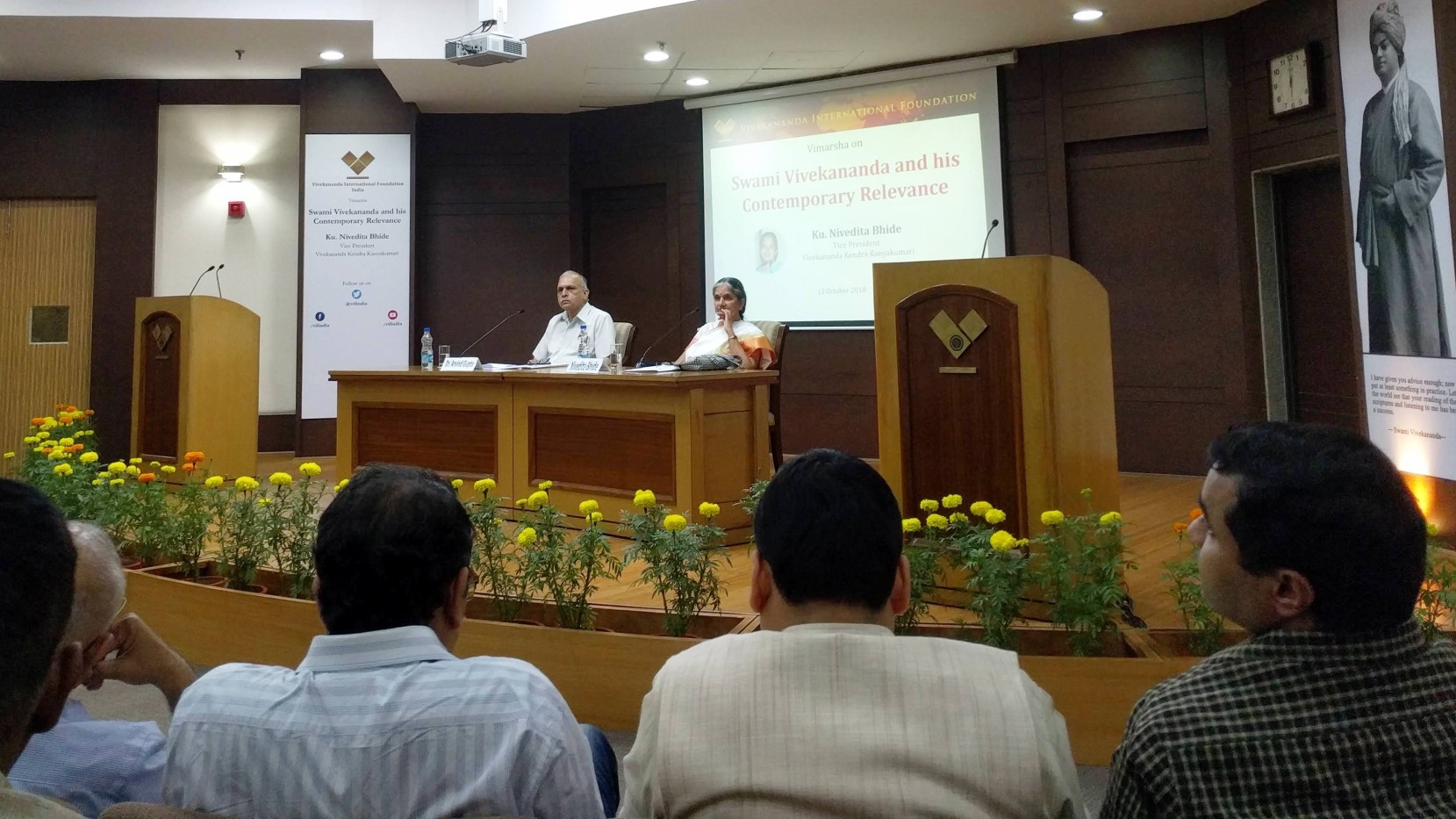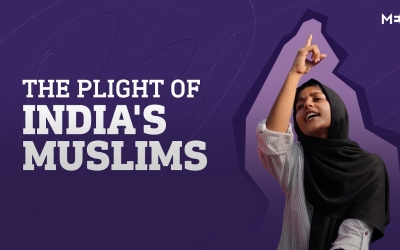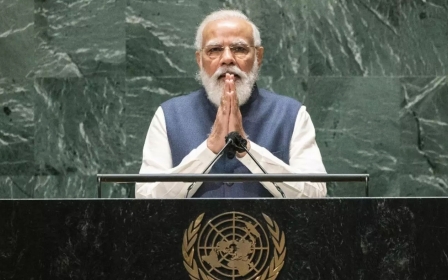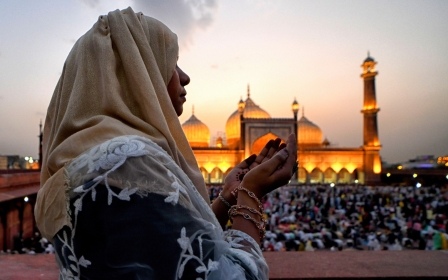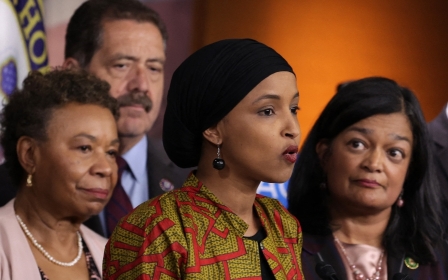Activists raise alarm over Hindu nationalist presence at Parliament of World Religions
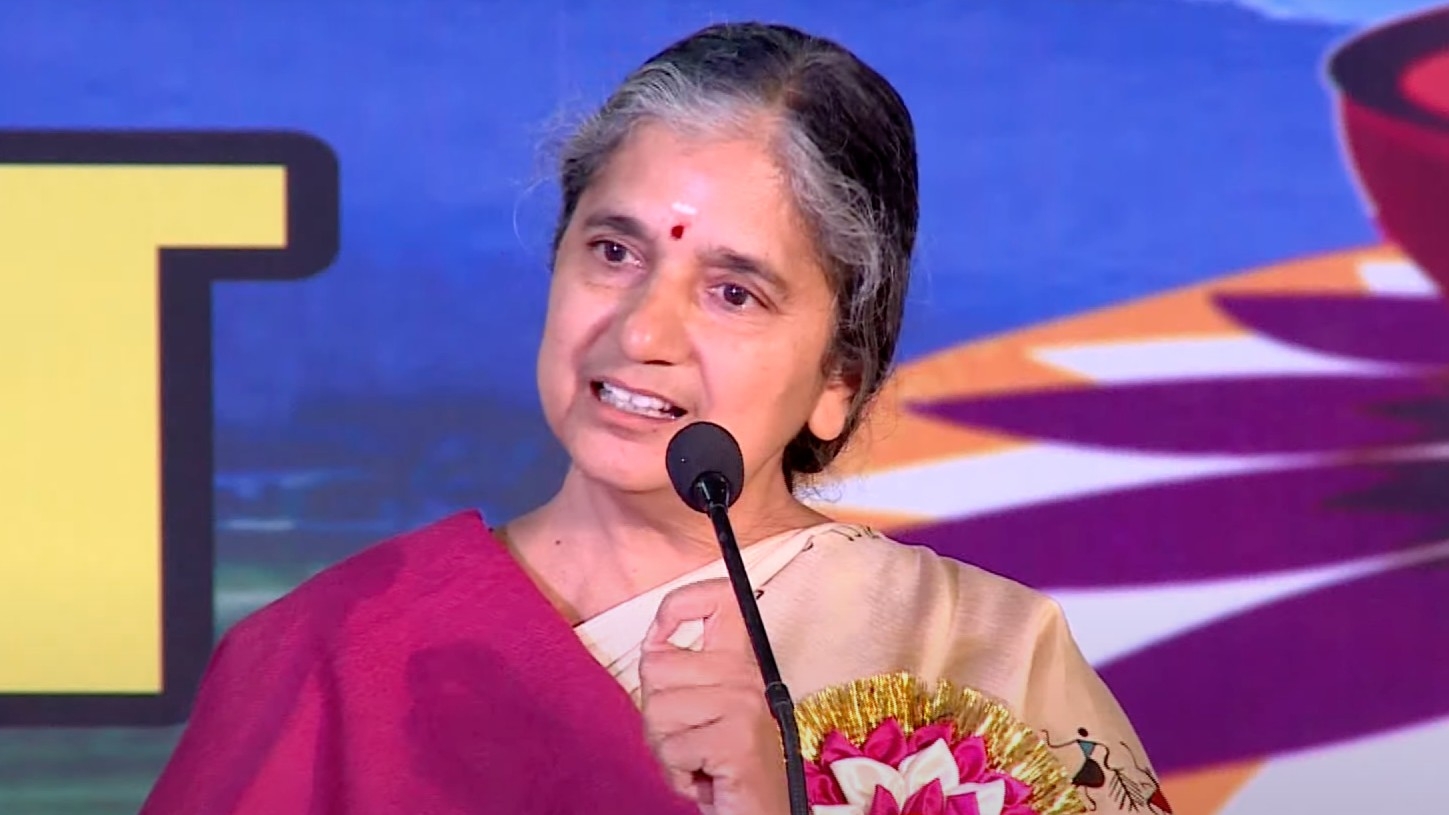
Activists and scholars have sounded the alarm over the presence of a Hindu nationalist leader linked with India's far-right at next week's Parliament of World Religions convention in the US city of Chicago.
Nivedita Bhide, the vice president of Vivekananda Kendra, a Hindu nationalist social service and "nation-building" organisation, is scheduled to address a plenary session at the conference on 16 August.
Bhide, who was awarded India's fourth highest civilian award by the government of Indian Prime Minister Narendra Modi in 2017, has routinely shared the rhetoric of right-wing Hindu nationalists who demonise prominent Indian activists.
Targets have included Afreen Fatima, a researcher and activist; Washington Post columnist Rana Ayyub; and the late Christian Priest, Father Stan Swamy.
Activists and scholars told Middle East Eye that Bhide is routinely present in events either hosted or endorsed by the RSS, a Hindu paramilitary organisation that aims to turn India into a Hindu state, and she actively promotes disinformation, conspiracy theories, and Islamophobia on social media.
She was also accused of amplifying support for the widely-condemned anti-Muslim propaganda films The Kashmir Files and The Kerala Story, and for spreading conspiracy theories about Rohingya refugees or a so-called "holocaust" against Hindus under Muslim rule in India.
"Participants in the Parliament of World Religion must vocally oppose the inclusion of Hindu nationalist Nivedita Bhide in the ‘A Call to Conscience: Defending Freedom & Human Rights’ conference," Rasheed Ahmed, the executive director of the Indian American Muslim Council (IAMC), told MEE.
"As the leader of the Vivekananda Kendra, an affiliate of the Rashtriya Swayamsevak Sangh (RSS) organization, Bhide is helping to advance a fundamentally exclusionary vision of India - the very opposite of 'defending freedom and human rights'."
'Deep connections' to far right
The Parliament of World's Religions describes itself as "cultivating harmony amongst the world’s spiritual traditions and fosters their engagement with guiding institutions in order to achieve a more peaceful, just and sustainable world".
Ahead of this year's convention, titled, "A Call to Conscience: Defending Freedom & Human Rights", the programme director, Phyllis Curott, said the parliament was "uniting in a collective, courageous, and clear reply to the most dangerous crisis confronting us today – authoritarianism."
'Bhide has personally engaged in spreading disinformation that demonises Indian Muslims'
- Audrey Truschke, Rutgers University
"These bullies and despots are pursuing nationalist wars and winking at domestic terrorism, they are fostering hate and the resurgence of anti-Semitism and Islamophobia, misogyny, and racism. And they are attempting to misappropriate religions to justify the unjustifiable," Curott said.
However, activists and scholars said the inclusion of personalities like Bhide, who have personal and deep family links to the RSS - an organisation that has organised hate against Muslims in India - doesn't add up. It also goes against the parliament's own objectives and statements.
Audrey Truschke, professor and Asian studies director at Rutgers University, who is also scheduled to participate at the forum, described Bhide's inclusion as "alarming".
"Bhide has personally engaged in spreading disinformation that demonises Indian Muslims in recent years, during which anti-Muslim violence has risen precipitously in India, under Hindu nationalist leadership," Truschke said.
"Bhide has deep connections with far-right political organizations that support Hindu nationalism, a deeply Islamophobic political ideology.
"Platforming such an individual - who actively participates in encouraging hate within a context of rising violence - is antithetical to the professed purpose of the Parliament of the World's Religions "'to cultivate harmony among the world’s religious and spiritual communities'", Truschke added.
Likewise, Pranay Somayajula, a writer and anti-Hindutva activist, said it "was deeply disturbing to see a known Hindu nationalist leader speaking at an event that is supposedly about "defending freedom and human rights".
"Hindutva is a reactionary, fascist political movement, and its proponents should not be welcome in any interfaith spaces," Somayjula said.
Founded by a former secretary general of the RSS in 1972, the Vivekananda Kendra was envisioned by the RSS' leadership to be an organisation that would promote "a soft and less strident Hindutva".
Vivekananda, a 19th-century Hindu monk, incidentally spoke at the first Parliament of World's Religions in 1893.
"I thank you in the name of the most ancient order of monks in the world. I thank you in the name of the mother of religions, and I thank you in the name of millions and millions of Hindu people of all classes and sects," Vivekananda told delegates present at the first Parliament of World's Religions in Chicago in 1893.
Though the organisation would not be controlled by the RSS, it "would maintain a close fraternal and ideological relationship supplementing the RSS mission", Pralay Kanungo, an assistant professor at the Leiden University Institute for area studies, wrote in an essay published in 2013 in The Hindu.
Scholars and activists cautioned that normalising figures such as Bhide at religious conventions sets a dangerous precedent.
"Their ideology has very little to do with Swami Vivekananda, whose name the RSS and Vivekananda Kendra have co-opted to justify its anti-Christian and anti-Muslim foundation," Raju Rajagopal, from Hindus for Human Rights (HfHR), told MEE.
He added that "their ideology and their work has little to do with the theme of this year's parliament", before adding that his organisation, the HfHR, had no plans to "de-platform" Bhide.
Still, he considered it crucial to "shed light on the fact that Vivekananda Kendra is perhaps the most important ideological training ground for future senior RSS leaders - a post-graduate training, if you will".
Likewise, Gwilym Beckerlegge, a professor at the Open University, told MEE that although she had not come across any reports that suggested Vivekananda Kendra had been involved in the kind of violent communalism associated with some of the RSS's affiliated organisations, the organisation was still committed to a Hindu-centred view of India.
There are areas in which its agenda overlaps considerably with that of the RSS," Beckerlegge, who has written extensively about the Vivekananda Kendra, said.
Ahmed, from the IAMC, said that ultimately it was important to remember the RSS was created to have multiple avenues to subordinate those who were not Hindu in India.
"RSS members have assaulted and killed Muslims for the entirety of their history, including now," he said.
"All members of this paramilitary organization and its affiliates bear responsibility for this violence, Bhide included," Ahmed added.
MEE reached out to the Parliament of the World's Religions, an international 501(c)3 NGO affiliated with the United Nations Department of Public Information, for comment, but did not receive a response by the time of publication.
Middle East Eye propose une couverture et une analyse indépendantes et incomparables du Moyen-Orient, de l’Afrique du Nord et d’autres régions du monde. Pour en savoir plus sur la reprise de ce contenu et les frais qui s’appliquent, veuillez remplir ce formulaire [en anglais]. Pour en savoir plus sur MEE, cliquez ici [en anglais].


